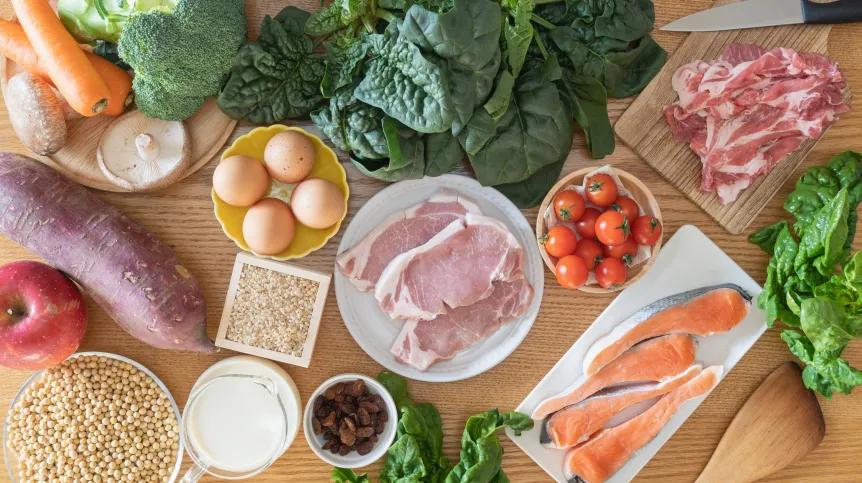
According to UN forecasts, the Earth's population will reach 10 billion in 2060. The overpopulation of the planet and the climate crisis generate new challenges when it comes to food production and distribution, scientists said during a debate at the Science Festival in Warsaw.
Currently, of the 8 billion people on Earth, one billion are starving and one billion are overweight. Scientists stressed that excess food in some parts of the world is not used rationally. Food is wasted. According to FAO (the Food and Agriculture Organization of the United Nations), every year 1 and 3/10 billions tons of food worldwide are being wasted - the food that is suitable for consumption, i.e. 1/3 of the food already produced.
'This is not only an economic problem, it is also an ethical and ecological problem', the host of the debate 'Food 4.0. What will our grandchildren eat?', Professor Dorota Witrowa-Rajchert said during the Science Festival in September in Warsaw.
As much as 60 percent of wasted food ends up in the garbage straight from our homes, which means that consumers are mostly responsible for food wasting. Almost 5 million tons of food are wasted in Poland. 'This food wasting contributes to soil degradation, littering and global warming,’ said Witrowa-Rajchert.
Professor Romuald Zabielski, a veterinary medicine expert, corresponding member of the Polish Academy of Sciences and a full professor at the Warsaw University of Life Sciences pointed out that not all countries would be equally affected by problems related to the overpopulation of our planet and climate change.
In his opinion, Poland is in a comfortable situation, also because we are a significant exporter of food to other countries. In 2022, exports of agri-food products reached a record amount of EUR 47.6 billion, which gave Poland the position of the 7th largest food producer in Europe.
According to the scientist, we mainly exported meat, dairy products, sweets, and - surprisingly - animal food. 'This gives us a comfortable situation in the face of these threats and challenges,’ Zabielski said. In his opinion, if there was a food shortage, 'we could simply react by limiting exports to meet our needs, even though these exports provide us with a lot of funds for our budget.’ We can also look for reserves in the form of reducing food waste.
According to Professor Zabielski, in the face of challenges, we can also rationalize our nutrition. He said that people in Poland ate too much meat. During the year, an average Pole consumes approximately 70-80 kg of meat, while 15 kg is sufficient for the proper functioning of the body. The World Health Organization recommends 35 kg of meat per person per year.
Lab-grown steaks and processed insects?
What will our grandchildren eat in the future? This will be influenced by the fourth industrial revolution, called industry 4.0, which we are witnessing. It revolutionizes the automation, monitoring and analysis of supply chains using intelligent technologies. Technological innovation, artificial intelligence, robotics and the Internet of Things can play a key role in improving production processes, reducing waste and optimising supply chains.
'The importance of products of plant origin will increase,’ said Dr. Rafał Wołosiak, dean of the Faculty of Food Technology of the Warsaw University of Life Sciences (WULS-SGGW) from the Institute of Food Sciences, Chair of Food Technology and Assessment at the Department of Food Quality Assessment. In his opinion, 'the importance of traditional animal products will decrease. Edible insects, which today raise some controversy, will enter our diet in a processed form and complement animal protein. Moreover, even today 1/3 of the population eats insects intentionally.’
There will also be so-called lab-grown steaks, i.e. meat of biotechnological origin. 'This is problematic now,’ Wołosiak admitted. He explained that 'it is not such a clean technology, it requires collecting cells from live animals.’ He noted that 'that the first steak made in the lab a while back cost hundreds of dollars. But if there is human interest, within a generation, if not less, this will be a very inexpensive technology.’
In his opinion, 'food of biotechnological origin in the traditional sense will definitely become more important. Now we are dealing with the production of individual substances by microorganisms, but our diet will include much more biomass generated by microorganisms in bioreactors. Specifically, it will mainly be yeasts and moulds. They will also become edible. I see the possibility of producing whole food products simulating, for example, traditional products of animal origin.’
When discussing trends in food production, scientists emphasized that, for example, more food would be produced in cities and offering ready-made food to consumers would become more important, i.e. food delivery will develop.
'I think that soon, due to the development of research on the human genome, the function of individual genes and the development of genomics, diets tailored to the needs consumers who will pay for them will be created for,’ Wołosiak said. He added that they will be based on genome analysis and their aim will be to increase the body's performance, both physically and mentally, and to limit the development of genetic diseases.
Dr. Andrzej Gantner, general director, vice-president of the Management Board of the Polish Federation of Food Producers of the Employers' Association, editor-in-chief of the quarterlyFood Lex, drew attention to the very high consumption of dietary supplements in Poland. In his opinion, this shows that 'we have no confidence in functional foods and the nutritional value of the products we eat. We have managed to convince ourselves that in order for our lives to be complete, our immunity to be intact, and our image to be expressive, we must consume dietary supplements,’ he said.
Today, the priority for many of us is to maintain or obtain a correct figure, and dietary choices that are supposed to promote health are in the background,’ said Dr. Joanna Ciborska, academic teacher, assistant professor at the Department of Human Nutrition, Faculty of Food Science, University of Warmia and Mazury in Olsztyn. She added that 'we are therefore able to decide to build our diet based on products that may not be acceptable to us sensorially, a diet that requires supplementation because it is unbalanced, or extremely elimination-based because we have some superior goals.’
According to Ciborska, 'it is not only important what we will eat, but also how we decide whether we want to eat it. We have never had such easy access to such tasty food before,’ the nutritional psychologist said. In her opinion, 'if we made food choices only at the physiological level, i.e. reacting to the feeling of hunger and satiety, we would probably have neither obesity nor diet-related diseases.’
She added that 'nutrition fulfils many other non-nutritional functions', so it not only provides us with energy and nutrients, but food creates relationships between people, connects and integrates.
'From the point of view of nutritional psychology, it is disturbing that today we are talking about relationships with food, i.e. we are not building relationships between people, but we have relationships with nutrition, we vent tensions and emotions in relationships with food,’ Ciborska said.
She added that the things that determined our choices depended on the home, the culture we came from, our food traditions and eating habits, accompanying emotions, the group we functioned in and how intensely it influenced our food choices.
The full recording of the debate is available here.
PAP - Science in Poland, Anna Mikołajczyk-Kłębek
akm/ kap/
tr. RL













